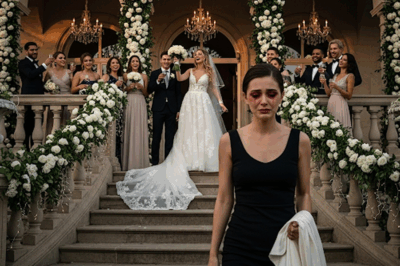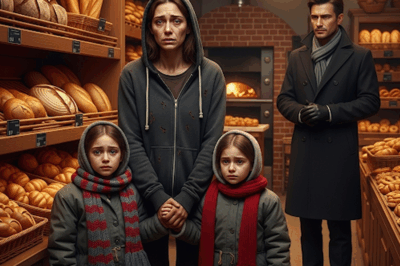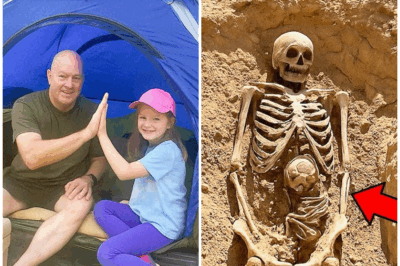
Millionaire CEO took his twins on a blind date, pretended to be broke. “Everything changed when she offered to pay the bill.” “You brought your kids to a date?” the hostess whispered, raising an eyebrow as Westwood adjusted the wriggling twins in his arms. “Yep,” he replied calmly, balancing a
diaper bag on one shoulder. “It’s not a date.
” “Not really.” The woman looked skeptical but gestured toward a table by the window. You’re in luck. Only one reservation with children tonight. Table five. Graham nodded, his heart pounding harder than any corporate negotiation he had ever handled. Wearing faded jeans and a plain t-shirt, he
looked nothing like the billionaire CEO gracing Forbes’s covers.
His tailored suits and driver were traded tonight for a borrowed 2009 Honda Civic and two mismatched hairbands holding up Ella and Emma’s curly hair. He set the girls down and helped them into booster seats. Emma immediately grabbed the salt shaker. Ella clutched her pink stuffed bunny and looked
around.
Graham took a breath, watching the door. He already knew the woman from the app had bailed. Her last message was Curt. Sorry, can’t date a broke dad of two. Good luck. He was about to gather the girls and leave when the front door opened, and in walked a woman with a tote bag slung over her
shoulder and a paperback in hand. She scanned the restaurant, squinting briefly at her phone.
Then her gaze settled on his table. She walked straight toward him, smiling nervously. “Hi, I’m Sadie,” she said, brushing her golden hair behind one ear. Sorry I’m late. Bus was slow. Graham blinked. Ah, I know. I know. Not exactly a grand entrance, she said, sitting down across from him, barely
looking at her phone again.
But hey, you said window table with kids, so I figured this must be it. He opened his mouth to correct her. But then he looked at her. Really looked. There was something quietly sincere in her eyes, something awkward but endearing in her smile. And behind all that, a weariness he recognized. “No
problem,” he said softly. “We just got here.” Sadi glanced at the girls who stared back, curious.
“I didn’t realize I’d be dining with such esteemed company,” she said with a smile. Emma squinted. “Do you like cats?” Sadi chuckled more than I like most people. Ella slid a purple crayon across the table. Draw one. And just like that, Sadie picked up a napkin and began sketching.
Within minutes, the girls were giggling, pointing at her lopsided kitten drawing, completely enchanted. Graham sat back, stunned. The usual awkwardness of introducing someone new to his daughters was gone. This wasn’t forced. It was effortless. Dinner arrived in a flurry of chaos. Spaghetti sauce
splattered onto the table, orange juice tipped, and napkins were sacrificed in the process. Sadi didn’t flinch.
She helped Emma wipe her chin and shared a story about how she once slipped and fell face first into a birthday cake at the library. The girls burst out laughing. Graham felt something stir deep in his chest, something warm, unfamiliar. It had been years since anything felt this natural. Sadi
didn’t ask about his job. She didn’t mention wealth or success or anything remotely resembling his public persona. She asked Ella what her favorite animal was.
She listened to Emma’s story about a magic rock she found. And when she caught Graham watching her, she smiled. Not coily, not flirtatiously, just genuinely. A server came by and placed the check on the table midmeal. “Take your time,” he said politely. “Desserts next.” Graham stared at the
leatherbound folder. His hand went to his back pocket, but froze.
This wasn’t his car. These weren’t his jeans. He wasn’t even sure there was a wallet in them. For a moment, panic flared in his chest. Sadi noticed. She did not make a scene. She simply pulled out her worn leather wallet, slid out a card, and handed it to the server with a soft smile.
“It’s fine,” she said, brushing a strand of hair behind her ear. “I’ve had worse dinner dates,” Graham turned to her stunned. “You didn’t have to.” “I know,” she interrupted gently. “But I wanted to. You looked like you needed someone to just be kind. He fell silent. The noise of the restaurant
faded around him. It was not about the money.
He could buy the entire block if he wanted to. But in that moment, it was about the way she saw him. Not the Westwood of headlines and shareholder meetings, but the man fumbling with booster seats and juice boxes. A man who was trying. He looked at her. Really looked. She had soft lines of
weariness around her eyes, probably from too many late nights with books, not parties.
Her blouse was simple. Her nails were unpolished. She was not trying to impress. She was just there, present, human, kind. The restaurant began to thin out, but their table stayed warm with laughter and crayons. Sadi reached for a bread stick and broke it in half, offering one to Ella while
continuing a story about her childhood.
“I grew up in a house where money was tight,” she said, eyes distant with memory. “But we had books stacked in every corner, on every shelf, even on the floor. My mom used to read to me every night by candlelight when the power went out. That is why I became a librarian. books made me feel rich
even when I had nothing else. Graham listened intently.
There was no envy in her voice, no longing for what she had missed, just quiet gratitude for what she had been given. It struck him deeply. Most of his dates had wanted to know about his house in Aspen, or what kind of wine he liked, or how many cars he owned. But Sadi never asked a single question
about his career.
She did not seem to care what he did, only who he was. And for the first time in years, Graham felt seen. “You must love your job,” he said. Sadi nodded. “I do. The kids who come in after school, they light up when I remember their names or set aside a book just for them. It is small, but it
matters. At least I like to think it does.
” Ella leaned her head on Sadie’s arm and Sadie gently brushed a crumb off the child’s cheek. “These girls,” she whispered, are something special. Graham swallowed hard. “They are my world.” When the meal ended, Graham stood and offered to walk Sadi to the bus stop, or at least give her a ride. “It
is not a fancy car,” he said with a ry smile. “But it gets from point A to point B.
” Sadi hesitated, glanced out the window. “It’s okay,” she said softly. “I like the walk. Helps me clear my head.” He tried not to look disappointed. “Of course.” She gave a little wave to the girls, bent to kiss Ella on the forehead. “Thanks for the cat drawing artist.” “Come draw again,” Emma
called. Sades smile lingered. “Maybe.
” And then she turned and walked into the night. Graham drove in silence. The twins were already dozing in their car seats, their hands still smudged with crayon. A single piece of napkin art fluttered from the dashboard, a scribbled picture of a cat with too many whiskers and the words Sadi plus
Ella in crooked letters. He stared at it when he parked in his garage, heart tightening.
His mind drifted backward to a different night long ago when his late wife Caroline had sat on the kitchen floor with the girls drawing farm animals with washable markers on old newspapers. Her laughter had filled the room. That memory had haunted him. It made every new connection feel like
betrayal.
But tonight, watching Sadi with the girls, hearing her laugh as orange juice soaked her sleeve, he had felt peace. Not guilt, not fear, just the quiet sense that maybe, just maybe, healing was not betrayal. Maybe it was permission to keep going, to begin again. He looked at the drawing one more
time, then folded it gently and placed it in the glove box.
A fragile hope settled in his chest. He had no idea if he would ever see Sadi again. But she had already left something behind, and for the first time in a long time, that was enough. It had been 4 days since their dinner. 4 days since Sadi had unknowingly walked into the wrong date and completely
disarmed him with nothing but crayons, spaghetti sauce, and sincerity.
Graham could not shake the image of her face. The way she laughed with the girls, the way she paid the bill without hesitation, without judgment. All he had to go on was a passing comment she made about her job. I work at the library near Pine Street, the one with the red doors.
On Saturday morning, Graham packed the girls into the car again. He told himself it was just a casual visit to the library. No expectations, no plans, just curiosity and maybe a little hope. The red doors were easy to find. Inside, the scent of old pages and wood polish wrapped around them like a
familiar blanket. Children sat cross-legged in a corner, clustered around a woman in a soft cardigan, a worn picture book in her lap.
And then the bear said, “Who took my hat?” Sades voice rose theatrically, making the kids giggle. Bill gasped. “That’s her.” Emma clapped. “She’s here.” Before he could stop them, the twins raced forward, squeezing between the other children to get closer to Sadi. She paused mid-sentence, startled,
and then slowly looked up.
Her eyes widened as she saw Graham standing at the entrance, hands in his jacket pockets, shoulders tense. “Hi,” he said softly. She closed the book. “Everyone, we’ll take a quick break. 5 minutes. Okay.” The kids groaned but dispersed toward the bean bags. Sadi stood. You found me. Graham nodded.
I remembered what you said about the red doors. The silence that followed was thick, not hostile, but uncertain.
Ella held up a folded piece of paper. We made you another drawing. Sadi took it with a soft smile. Thank you, sweetie. Then her gaze shifted back to Graham. You were not the man I was supposed to meet that night. No, he admitted. You were meeting someone else. Sadie crossed her arms. Then why did
you stay? Graham inhaled slowly.
Because I could not walk away. Not when someone finally saw me. Not Westwood, the CEO, or the guy with a ridiculous net worth. Just me. The dad trying to keep it together. The man who misses his wife. The man who needed a night that did not feel like a transaction. Sades lips parted slightly. Her
expression was unreadable. “I didn’t lie,” he said quickly.
“I didn’t pretend to be someone else. I just didn’t correct you because for once, someone wasn’t looking at me through a lens of money or power. You sat down and listened to my daughters. You paid the bill without flinching. You laughed when things got messy.” Her eyes softened but didn’t drop. He
stepped a little closer. “My name is Graham Westwood.
I run a company that probably made your libraryies donation boxes. I own too many suits and live in a house that is too big for three people and most of the time I hate it. But the other night, I didn’t feel like any of that mattered because of you, Sadi swallowed, glancing at the twins who were
flipping through books nearby. So, she said quietly.
What now? I don’t know, he said honestly. I just knew I couldn’t let you disappear without telling you the truth. Not because I think it’ll change anything, but because you deserve that much. She looked down at the cat drawing in her hand.
It had a pink heart over its head and the words for Sadi scribbled in black letters. “What I saw that night,” she murmured, was real. The way you looked at them, the way they looked at you, the way you watched me, like you were seeing something that scared you. That wasn’t fake. It wasn’t, he said.
She met his eyes again. But I need time to figure out what’s real when everything else around you feels complicated. He nodded.
Take all the time you need. A long pause hung between them. Not goodbye. not yet. And that for the first time felt like enough. In the days that followed, their meetings were small, quiet things. Graham brought the twins to the library more often, on purpose, of course. Sadi would smile when she
saw them enter, always pretending to be surprised.
They met at the park once, too. The girls running barefoot through the grass while Sadi read aloud from a children’s novel. Graham sat on the bench watching her, realizing how her presence made even an ordinary afternoon feel significant. Not flashy, not dramatic, just steady. Then one Friday
evening, a folded piece of paper showed up in Sadi’s mailbox.
Childlike handwriting scrolled across it. It, “Dear Miss Sadi, come eat dinner with us. We made drawings and cookies. Love, Ella and Emma and Daddy, too. Sadie pressed her hand to her chest and smiled already knowing she could not say no.
That Sunday, Graham drove them to a small cottage tucked away at the edge of town. “This was my mom’s house,” he explained as they pulled into the gravel driveway. “I keep it just as it was. It’s where I go when I don’t want to be Mr. Westwood.” The house was modest and warm with flower pots along
the porch and an old windchime clinking softly.
Inside, Ella and Emma had transformed the living room into a gallery of crayon masterpieces taped to every wall. Sadi laughed as she walked in. You weren’t kidding about the drawings. Ella grabbed her hand. Come sit by me. It was simple spaghetti again by popular demand. Graham wore an apron that
said kiss the cook and pretended not to be embarrassed when the sauce splattered onto his shirt. The girls chattered non-stop about library books and favorite colors.
Sadi listened, asked questions, passed the bread and never once looked at her phone. After dinner, Graham brought out a box of old board games while Sadie helped clean up. As she leaned down to tie Ella’s shoe, the little girl’s head tilted back, curls bouncing. “Your hairs in your eyes,” Sadie said
gently, reaching out.
She brushed Ella’s bangs aside and carefully clipped a tiny hair pin in place. Ella beamed. Graham stood in the doorway, drying a plate, his heart stilled. In that moment, something shifted. The way Ella looked at Sadi with pure trust, with the kind of affection only a child could offer freely,
took his breath away. It was not forced, not coached.
It was real. Sadi sat back on her heels and looked up. I’ve never seen a child trust me that quickly. Graham’s voice was low. I’ve never seen anyone make them feel safe so fast. She looked at him, surprised. I mean it, he said, setting the dish towel aside. They don’t take to people easily.
After Caroline passed, it’s like they could sense everything, the good, the fake. You walked into our lives, and it was like they’d been waiting for you. Sadi’s eyes glistened. She looked away, brushing a hand over her jeans. I don’t know what I’m doing half the time. I just care. That’s exactly
what they need. The girls were now curled up with a picture book, their heads resting on each other.
The evening light fell soft through the curtains. The world outside, its chaos, its headlines felt miles away. Said he turned back to Graham. You’re different here. I’m myself, he said. When I’m not being chased by headlines or asked about stock projections. She stepped closer. You don’t have to
prove anything here.
Not to them, not to me. He smiled. That’s what scares me most. That it’s real. Sadi’s voice dropped to a whisper. Then don’t run from it. Graham looked at her. Really looked. The kind of gaze that reached past charm, past surface. It lingered not because of romance but because of gratitude, because
of awe. Because somehow, without trying, she had already become part of their little world. And for the first time in years, that world did not feel broken.
The photo appeared online on a quiet Tuesday morning. A grainy image taken through the branches of a nearby tree. Sadie holding hands with Ella and Emma as they skipped down the sidewalk outside the Pine Street Library. She was smiling. The girls were laughing. The caption underneath read, “Mstery
woman spotted with Westwood twins, who is she?” Within hours, her name was trending. By evening, the press had connected the dots.
Paparazzi swarmed her small apartment building. Camera lenses peaked between blinds. Microphones thrust toward her as she left for work. Headlines speculated everything. Marriage, scandal, secret children. They tore through her life with no regard for truth. Graham saw the storm unfold in real
time.
His name was everywhere again, but this time it came with someone he cared about, someone who had never asked for this. He tried calling. She did not answer. At the library the next morning, the director called her into a small office. His expression was tired, regretful. “There’s been pressure,”
he said, not meeting her eyes. “One of our top donors threatened to pull funding.
They’re concerned about the media frenzy. They say it’s distracting.” Sadi’s heart sank. “I didn’t do anything wrong.” “I know,” he said quietly. “But they don’t care about right and wrong, just appearances. She walked out of the library with her box of things, the whispers of co-workers following
her like shadows.
It had taken her years to build that small, quiet life, and now with one photo, it was gone. That night, she sat on her couch in silence. Her phone buzzed. Dozens of texts from numbers she didn’t recognize, news reporters, curiosity seekers, commenters with opinions. Only one message she read more
than once. Sayi, please talk to me. I had no idea this would happen. Graham. But she didn’t reply.
The next morning, the chaos came to her door. Dozens of reporters lined the sidewalk in front of her building. Neighbors peaked out of windows. One woman down the hall shouted, “Is it true? Are you marrying him?” Then a new sound rose above the shouting. A car door slammed. Footsteps. The
unmistakable hush that fell over a crowd when something or someone unexpected appeared.
Graham Westwood stood at the base of the steps, his tailored coat unbuttoned, his hair a little unckempt from the wind. The cameras snapped wildly. He ignored them all and looked straight at Sades door. From the window above, she watched him. Her hands trembled at the edge of the curtain.
He took a step closer, raised his voice just enough to carry above the noise. I can’t change the world, Sadi, he said. But I can stand between you and it can take the cameras, the questions, the noise. Just say the word. His voice cracked slightly. Let me stand with you. She stood frozen at the
door, her heart thudding painfully.
Tears welled in her eyes. Her fingers hovered over the lock, but she did not turn it. Instead, her voice came out small but clear through the door. “You have to protect your daughters. Don’t let them get caught in this mess. They’re already in it,” he replied.
“Because they asked about you every night this week, because they miss you, and so do I.” She swallowed a sob. I didn’t ask for this. I know, but neither did we. And yet somehow this became the most real thing I’ve had in years. A long silence passed. The cameras clicked. The wind blew. “I’m
sorry,” she whispered through the door. “But I need you to go.” He stood there a moment longer, nodding slowly.
Then he turned and walked back through the crowd, each step heavy, deliberate. Sadi slid to the floor, her back against the wood, the box of her library things beside her. She closed her eyes, and for the first time in years, she wished the world would just stop spinning. Sadi had not moved the
drawing. It was still taped to her front door, wobbly lines, uneven hearts, and the words, “We miss you, Miss Sadi,” written in crayon. Ella had drawn it in purple.
Emma’s handprint was stamped in orange at the corner. For 3 days, Sadi paused every time she stepped outside, her fingers brushing against the paper. And each time she walked away, her heart aching. The media frenzy had calmed slightly, shifting attention to another scandal elsewhere. But the
damage had been done.
Her job was still on hold. Her name still floated in the ether of online gossip. She told herself it was better this way. Distance, silence, no attachments. But every night she dreamed of small hands in hers and giggles over picture books. She missed the messy dinners, the chaotic drawings, the
warmth that had once filled the small house on the edge of town. She missed them.
At Graham’s home, silence had settled in, thick and hollow. The girls noticed it more than he expected. They did not understand public scrutiny or donors pulling support. All they knew was that Sadi had vanished. On the third night, Emma climbed into his lap just before bedtime, her eyes glossy
with confusion. “Is Miss Sadi gone forever?” she asked.
Graham brushed a tear from her cheek. No, sweetheart. She just needs a little time. Emma clutched his shirt. Did we do something wrong? Graham’s chest tightened. Not at all. She loves you so much. Emma’s voice wavered. Then why didn’t she come back? He had no answer. The next morning, he found both
girls sitting at the kitchen table surrounded by crayons.
They were quiet, unusually focused. When they were done, Ella held up the paper. a new drawing. This one of three stick figures labeled us with hearts floating around them. Above it the words, “We bring our hearts.” Graham looked at it for a long time. Then he stood up. “We’re going to see her,” he
said. Ella’s eyes lit up.
Emma clapped. They dressed quickly. No cameras followed them this time. He took the side streets, parked two blocks away, carried the girls in his arms to avoid the lingering press. When they reached her door, the old drawing was still there, fluttering slightly in the breeze. He knocked. No
response. He knocked again, softer this time.
Still nothing. He looked down at his daughters. Are you ready? Ella nodded and reached up, taping their new drawing directly underneath the old one. Then the girls stood side by side in front of the door, arms stretched out, ready for a hug neither of them knew for sure they would receive.
Inside, Sadi had been sitting on the floor, surrounded by books she was trying to reorganize just to keep her mind busy. When she heard the knock, she froze. Then she heard it. Small voices giggling, the rustle of paper, and the unmistakable sound of love waiting on her doorstep. She opened the
door slowly and there they were.
Ella and Emma stood with arms wide, eyes bright. No fanfare, no press, just hope. I, Ella whispered. Sadi fell to her knees, arms flinging open, tears already streaming down her face. The girls ran into her embrace without hesitation, burying their faces into her neck. I missed you, Sadi choked
out. so so much. Graham stood quietly behind them, his hands in his coat pockets.
He waited until Sadi looked up, her eyes rimmed with emotion. “I didn’t come with headlines,” he said. “I didn’t come with promises. I just came with my heart and theirs.” She stood slowly, still holding the girls. “Why did you really come?” He exhaled.
Because I can live without fame, without money, without the noise, but not without this, not without you. The girls squeezed Sadi tighter. She closed her eyes. I thought I had to protect you from all of it. You were trying to protect us by leaving, he said gently. But that’s not protection. That’s
pain. She opened the door wider. Then come in. He stepped forward.
The girl still wrapped around her legs. The moment was quiet. No reporters, no flashing lights, just four hearts in a doorway. “I don’t need anything else,” he whispered. She nodded, her voice breaking. “Me neither.” And this time, no one let go. Life after that day did not return to what it had
been before, but it became something better, different, quieter, more honest.
Graham and Sadi began again, not in secret, not with fanfare, but with a quiet determination to do it right. There were no staged photo ops, no grand declarations, just walks in the park, story time in the living room, and grocery runs where Ella insisted on pushing the cart while Emma rode inside
it. Sadi moved slowly, cautiously, but she stayed.
And Graham respected that pace, never rushing, never pushing. The world had already tried to rip her out of her comfort zone, he would not be the one to do it again. Instead, he asked her gently, “If you could do anything in the world, anything, what would it be?” Sadi smiled, “Start a reading
program for kids who don’t have books at home.
for the ones who wait in the back of the library until closing time because they don’t want to go home. Graham nodded. Then let’s build it. They called it Story Nest, a free mobile reading program that traveled to shelters, community centers, and underserved schools. Sadi organized volunteers,
picked out books, read to children with the same warmth she had shown Ella and Emma that first night.
Graham funded it quietly. He let Sadi lead every decision. When reporters called, he declined interviews. Instead, his team issued press releases highlighting Story Nest and its impact. Slowly, the narrative shifted. Headlines became less about the mystery librarian and more about the program
itself. At home, their rhythm became beautifully mundane.
Sadi began staying for dinner more often, then overnight when the girls asked. She read them bedtime stories, voicing each character differently while they clung to her arms, begging for one more page. She taught them how to draw faces with emotions, how to write their own tiny picture books.
Graham often watched from the hallway, heart swelling with something deeper than happiness, something closer to home.
One evening, after a story about a lost bear who found a new family in the forest, the girls yawned sleepily under the covers. Sadi tucked them in, brushing back their hair. Emma reached up, blinking slowly. Miss Sadi. Yes, sweetheart. Can I call you Mama Sadi? The room went still. Graham stood
frozen, not breathing. Sades eyes filled instantly.
She dropped to her knees beside the bed, clutching Emma’s tiny hand. “If that’s what you want, then yes, of course you can.” Emma nodded, curling closer. Ella reached out for her, too. Sadi kissed their foreheads gently, her tears falling silently. Graham stepped into the room, then sat on the edge
of the bed, and took Sadi’s hand in his. He did not speak.
He did not need to. The girls fell asleep, holding on to her fingers. Later that night, after the dishes were done and the house was quiet, Graham and Sadi sat on the porch wrapped in a blanket, listening to the windchimes his mother had hung decades ago. I never wanted to replace anyone, Sadi
whispered. You didn’t, he said. You became something entirely your own.
She leaned her head against his shoulder. I didn’t think I had enough to give. Graham looked at her, voice thick. “You gave them a safe space. You gave me a reason to believe again.” Sadi smiled through fresh tears. “I guess this us just happened.” “No,” Graham said. “It didn’t just happen. We chose
this.
Every small moment, every quiet choice, we made this.” She nodded, her heart full. And in the stillness of that evening, under the ordinary glow of porch light, a family was no longer forming. It was already whole. One year later, much had changed, and yet everything remained beautifully simple.
Sadi still lived in her cozy apartment above the bookstore on Pine Street.
She returned to the library, not out of necessity, but love. Children still ran into her arms and her name appeared in quiet stories about Story Nest, but no one called her the CEO’s fiance anymore. She was just Sadi, and that was more than enough. Graham never asked her to move into his estate. He
understood she needed roots, not marble floors.
Instead, they spent most of their time at the old cottage, a place of crayons, warmth, and windchimes. On a soft spring afternoon, they had a small family picnic in the backyard. Graham had rebuilt the table from the night they met. Worn wood, mismatched chairs, and all. Sadi smiled as she saw it.
You brought back the wrong table.
Some mistakes, Graham said, grinning, are worth keeping. The girls ran barefoot, tangled in daisy chains and laughter. After dessert, they disappeared inside and came back giggling, carrying a tiny box wrapped in napkins. “For you,” Emma announced, dropping it into Sades lap. “Inside was a ring
made from soft rope and colorful beads, uneven and precious.
We made it,” Ella said. “It’s your special ring.” Graham knelt beside her. His voice trembled. I used to believe I’d only be loved for what I had. My name, the money. But then came a wrong table, two little girls, and a woman who looked past all of it and saw me. He took her hand. I’m not asking for
a headline or a grand ceremony. Just this. Be you with us, with them.
Be the heart of this home. He paused. Sadie Quinn, will you marry me? Sadi laughed through her tears. She looked at the homemade ring and slipped it onto her finger. We’ve been a family for a while now. You’re just catching up. The girls squealled, circling them with hugs and giggles.
There were no cameras, no breaking news, only sunlight, wind, and two children who had unknowingly crafted the most unexpected love story. That evening, as the sky turned gold, Graham and Sadi sat on the porch swing, arms wrapped around each other. “You weren’t the wrong woman,” he whispered. “Just
the right one at a table no one expected.” Sadi smiled. “And you were never the billionaire.
You were the dad with kind eyes and spaghetti on his shirt. In the quiet of that ordinary day, they began the rest of their lives. Sometimes love does not come with perfect timing. It arrives softly, sits at the wrong table, and turns your world right. Graham had tried to guard his heart behind
wealth. Sadi feared her small world could not hold something as big as love.
But in the end, it was not the mansion or the money. It was bedtime stories, crayon hearts, and a woman who chose to see the man, not the name. Thank you for being part of this soul stirring journey of love, healing, and hope.
If this story touched you, if it reminded you that home is where the heart is, not the headlines, then please subscribe to Soul Stirring Stories. We bring you real emotional tales that heal, inspire, and stay with you long after the screen fades to black. Until next time, stay kind and never
underestimate the power of a wrong table, two little hands, and a heart that chooses love. Subscribe now. [Music]
News
Un Vaquero Solitario Encuentra a la mujer Rubia colgada del techo: “Amante Apache” Letras quemadas..
El hombre solitario de la montaña encontró a una mujer rubia colgando del techo con un letrero en letras quemadas…
“Mom’s Sick, So I Came Instead.” Little Girl Walked Into the Job Interview—What the Millionaire CEO…
Mom’s sick, so I came instead. Little girl walked into the job interview. What the millionaire CEO did next was…
He Moved Into an Abandoned Farm — But 3 Gorgeous Women Were Already There
¿Estás loco?”, susurró alguien detrás de él ese día. Pero Thomas Branigan no se inmutó. Tenía la mirada fija en…
La echaron de su propia casa tras la muerte de su esposo, creyendo que era solo una viuda indefensa sin a dónde ir. Nadie imaginaba que guardaba un secreto capaz de cambiarlo todo: una herencia oculta valorada en 2.800 millones. Aquellos que la despreciaron pronto descubrirían que la mujer a la que humillaron era mucho más poderosa de lo que jamás pensaron. Una historia de injusticia, sorpresa y una venganza inesperada. ¿Quieres que lo haga en tono más noticia impactante o más relato dramático?
Tiraron mi ropa al césped mientras yo todavía llevaba puesto el vestido del funeral. Mi marido multimillonario apenas se había…
Madre Humilde No Podía Pagar el Pan para sus Hijas — Hasta que un Millonario Llegó y lo Cambió Todo
Madrid, panadería San Miguel. Una tarde de diciembre. La nieve cae suavemente mientras el aroma del pan fresco llena el…
Niña y Tío Desaparecieron Acampando, 5 Años Después la Cámara de un Paracaidista Captura…
Un tío y su sobrina de 7 años partieron para un viaje rutinario de camping de una noche en las…
End of content
No more pages to load












